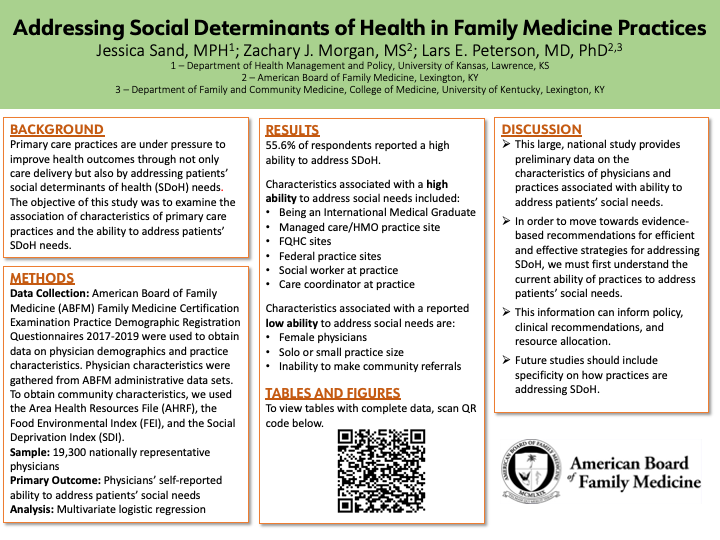SRFP123: Rural Family Physicians’ Ability to Address Patients’ Social Determinants of Health Needs
Jessica Sand, MPH, Lars Peterson, MD, PhD, Zachary Morgan, MS
Abstract
Context: Primary care practices are under pressure to improve health outcomes through not only care delivery but also by addressing patients’ social determinants of health (SDoH). Whether rural practices will have resources to address these needs remain unknown. Objective: To examine rural family physicians’ ability to address patients’ social needs compared to their urban counterparts. Study Design: Cross-sectional survey using multi-variate regression analysis. Dataset: 2017-2019 American Board of Family Medicine (ABFM) Family Medicine Certification Examination Practice Demographic Registration Questionnaire. This survey is completed by family physicians applying to continue their ABFM certification and has a 100% response rate each year. County-level data on percent in poverty, social deprivation, and food environment index were also included. Population Studied: Over 19,000 family physicians who are representative of the larger pool of ABFM certified family physicians. Outcome Measure: Physicians’ self-reported ability to address patients’ social needs. Anticipated Results: Hypotheses are: 1. Rural family physician practices will have less ability to address patients’ social needs than urban practices, and 2. Family physicians practicing in rural areas with higher social deprivation will report more practice ability to address patients’ social needs. Initial analyses show rural family physicians are statistically more likely to address patients’ SDoH, however the magnitude of the association is not likely clinically significant. The final results will be presented at the conference. Conclusion: Practice characteristics other than geography may have a more significant impact on the ability to address patients’ social needs in rural practice

Jack Westfall
jwestfall@aafp.org 11/20/2021This is a great topic and research study. Nice work. Thanks